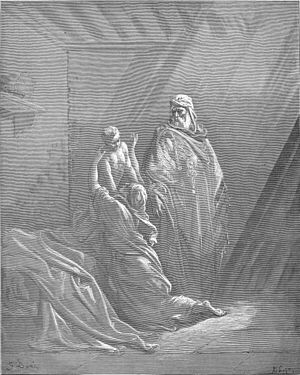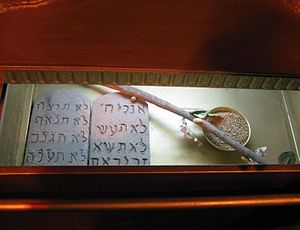 Image via Wikipedia
Image via WikipediaWhen God speaks prophetically through a man, God's Word comes true. However, prophets are not like fortune tellers in that they don't use tarot cards, crystal balls, or devices to communicate the future simply because someone requests it. Prophets speak God's Word when God choses to speak through them. Typically, these prophecies have significant national and spiritual ramifications. In fact these opening chapters are replete with supernatural events that are recorded as though they were normal.
So, 2 Kings opens with the fulfillment of God Word as spoken through Elijah the Tishbite. Though Ahab's son succeeded his father to the throne, he died shortly afterwards. There were no heirs. The prophecy spoken in 1 Kings 21:17-29 was fulfilled.
In the sight of his apprentice and fifty other prophets, Elijah the Tishbite, was taken up to heaven when chariots of fire suddenly appeared and carried him off. Elijah never died - he was taken up to heaven alive. After this, the Spirit of God came to rest on Elisha who was empowered to divide the waters of the Jordan River, as Elijah had done earlier.
Some time later, after supernaturally removing toxic substances from a vital spring, Elisha was walking near Bethel when a group of forty two youth ganged up on him, followed him, viciously scorning and mocking him. In Hebrew, mocked is קָלַס (qalac), which means to deride, to pronounce to be worthless. This was not a good-natured, innocent childish prank. These young people expressed a hatred and disregard for the God of Israel, that they learned in their homes. This group of youth publicly harassed a man upon whom Spirit of God rested and through whom miracles have already been accomplished. Maybe because Elisha saw these humans as full fledged instruments of demons, he called a curse on them in the Name of the Lord. Curse, execration, or קְלָלָה (qĕlalah) in Hebrew, is not a spell but rather a statement of how absolutely loathesome or detestable a behaviour is (in God's eyes).
All sin is is an abomination before God; all sin separates man from a holy God. When those kids on the road around Bethel scorned Elisha, they were in fact scorning and ridiculing the God of Israel. When Elisha proclaimed, in the Name of God, how reprehensible they were before God, two bears emerged from the forest and mauled them. God showed that He agreed with Elisha.
Later, when the forces of Moab gathered to fight against Joram, King of Israel, God gave Israel a supernatural edge over them, causing Moab to be defeated and their towns routed.
In these chapters, God acted supernaturally not just to protect the land of His people, but also to further demonstrate that He alone is God, Sovereign over All, Creator of the Universe. The physical and temporal world in which man lives is but one aspect of the universe over which God has dominion. Israel was to note the miracles attending Elijah and Elisha, as well as the other prophets, and to turn to the God of Israel, and worship Him alone. But, mostly, God showed that no matter what, He would not give up on His people, Israel.
Blue Letter Bible. "Dictionary and Word Search for qalac (Strong's 7046)". Blue Letter Bible. 1996-2011. 25 May 2011. < http:// www.blueletterbible.org/lang/lexicon/lexicon.cfm?
Strongs=H7046&t=KJV >
Blue Letter Bible. "Dictionary and Word Search for qĕlalah (Strong's 7045)". Blue Letter Bible. 1996-2011. 25 May 2011. < http:// www.blueletterbible.org/lang/lexicon/lexicon.cfm?
Strongs=H7045&t=KJV >
So, 2 Kings opens with the fulfillment of God Word as spoken through Elijah the Tishbite. Though Ahab's son succeeded his father to the throne, he died shortly afterwards. There were no heirs. The prophecy spoken in 1 Kings 21:17-29 was fulfilled.
In the sight of his apprentice and fifty other prophets, Elijah the Tishbite, was taken up to heaven when chariots of fire suddenly appeared and carried him off. Elijah never died - he was taken up to heaven alive. After this, the Spirit of God came to rest on Elisha who was empowered to divide the waters of the Jordan River, as Elijah had done earlier.
Some time later, after supernaturally removing toxic substances from a vital spring, Elisha was walking near Bethel when a group of forty two youth ganged up on him, followed him, viciously scorning and mocking him. In Hebrew, mocked is קָלַס (qalac), which means to deride, to pronounce to be worthless. This was not a good-natured, innocent childish prank. These young people expressed a hatred and disregard for the God of Israel, that they learned in their homes. This group of youth publicly harassed a man upon whom Spirit of God rested and through whom miracles have already been accomplished. Maybe because Elisha saw these humans as full fledged instruments of demons, he called a curse on them in the Name of the Lord. Curse, execration, or קְלָלָה (qĕlalah) in Hebrew, is not a spell but rather a statement of how absolutely loathesome or detestable a behaviour is (in God's eyes).
All sin is is an abomination before God; all sin separates man from a holy God. When those kids on the road around Bethel scorned Elisha, they were in fact scorning and ridiculing the God of Israel. When Elisha proclaimed, in the Name of God, how reprehensible they were before God, two bears emerged from the forest and mauled them. God showed that He agreed with Elisha.
Later, when the forces of Moab gathered to fight against Joram, King of Israel, God gave Israel a supernatural edge over them, causing Moab to be defeated and their towns routed.
In these chapters, God acted supernaturally not just to protect the land of His people, but also to further demonstrate that He alone is God, Sovereign over All, Creator of the Universe. The physical and temporal world in which man lives is but one aspect of the universe over which God has dominion. Israel was to note the miracles attending Elijah and Elisha, as well as the other prophets, and to turn to the God of Israel, and worship Him alone. But, mostly, God showed that no matter what, He would not give up on His people, Israel.
Blue Letter Bible. "Dictionary and Word Search for qalac (Strong's 7046)". Blue Letter Bible. 1996-2011. 25 May 2011. < http:// www.blueletterbible.org/lang/lexicon/lexicon.cfm?
Strongs=H7046&t=KJV >
Blue Letter Bible. "Dictionary and Word Search for qĕlalah (Strong's 7045)". Blue Letter Bible. 1996-2011. 25 May 2011. < http:// www.blueletterbible.org/lang/lexicon/lexicon.cfm?
Strongs=H7045&t=KJV >












